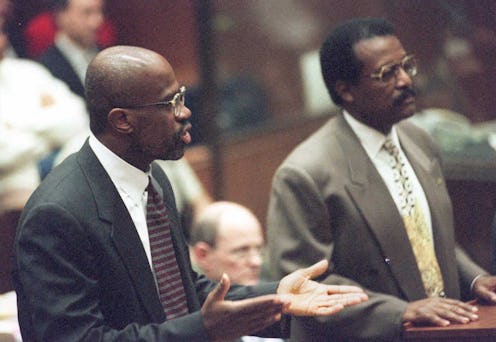Entertainment
Tensions Boiled Over During The O.J. Simpson Trial
Even though we all know that the trial will end with a "not guilty" verdict, The People v. O.J. Simpson: American Crime Story has managed to be a gripping depiction of the Simpson case. In the March 15 episode "Conspiracy Theories," viewers watched the prosecution take a major blow that has gone down in history — Christopher Darden asked Simpson to try on the bloody glove and it proved to be too small. And, as last week's episode came to a close, the court was alerted of the Fuhrman Tapes, which ultimately played a huge role in the trial and were another massive blow to the prosecution's case. When they learned of the recordings, Simpson's defense attorneys immediately petitioned for evidence of Mark Fuhrman's alleged racism to be admissible — but did Johnnie Cochran and Darden really fight over race in court as the trailers indicate?
When the Furhman Tapes surfaced, Cochran and Darden indeed had a tense courtroom exchange over whether or not they should be played for the jury. In January 1995, The New York Times described it as an "unusually heated exchange" between the defense attorney and prosecutor. USA Today echoed similar sentiments, noting that it was "a highly personal exchange that dramatically underscored the racial dimensions of the celebrated case."
Because Fuhrman was one of the first investigators to arrive at the crime scene and he discovered the now-infamous bloody glove, defense attorneys requested that the tapes of him saying the n-word repeatedly be presented to the jury as evidence of his alleged racism so they could cross-examine him about whether or not he planted the glove. Since the jury was predominantly black, Darden argued that the testimony would prejudice jurors against Furhman and the other white police officers who were also slated to testify. When Fuhrman was directly asked if his testimony was true and if he had planted any evidence during the trial, he evoked the fifth amendment, as reported by the LA Times. In his book Murder in Brentwood, published after the trial in 1997, Fuhrman wrote, "I apologize for the pain I caused with my insensitive words. However, one thing I will not apologize for is my policework on the Simpson case. I did a good job; I did nothing wrong."
The New York Times quoted Darden as saying that playing the "race card" would shift the focus of the case towards race rather than guilt versus innocence. Since Darden and Cochran were the only two black lawyers on the case, Darden argued that "it becomes a question of who is the blackest man up here," in reference to himself and the lead defense attorney. The report indicated that it was an emotional moment for Darden — they described his voice as "trembling" when he stated that he would not say the n-word out loud because it's such an abhorrent slur:
It's the filthiest, dirtiest, nastiest word in the English language... It will do one thing. It will upset the black jurors. It will say, Whose side are you on, 'the man' or 'the brothers'? There's a mountain of evidence pointing to this man's guilt, but when you mention that word to this jury, or any African-American, it blinds people. It'll blind the jury. It'll blind the truth. They won't be able to discern what's true and what's not.
In response, Cochran argued that Darden's statements were demeaning to the jury because they implied that black jurors were incapable of separating facts from emotions. USA Today quoted him as saying Darden's words were "perhaps the most incredible remarks I've heard in a court of law in the 32 years I've been practicing." According to The New York Times, he went on to address the prosecutor directly with these strong words: "I'm ashamed for Mr. Darden to allow himself to become an apologist for [Fuhrman]." The paper noted that, when he made this statement, Cochran turned away from Judge Ito and looked straight at Darden. After a complaint from Darden, Ito ordered Cochran to address the entire court.
Throughout the trial, there was no shortage of tension and even personal attacks between the prosecutors and the defense attorneys, but Robert Shapiro described Cochran and Darden's exchange as unusual to the NY Times: "I have never seen anything like this, and I hope never again to have to see it."
